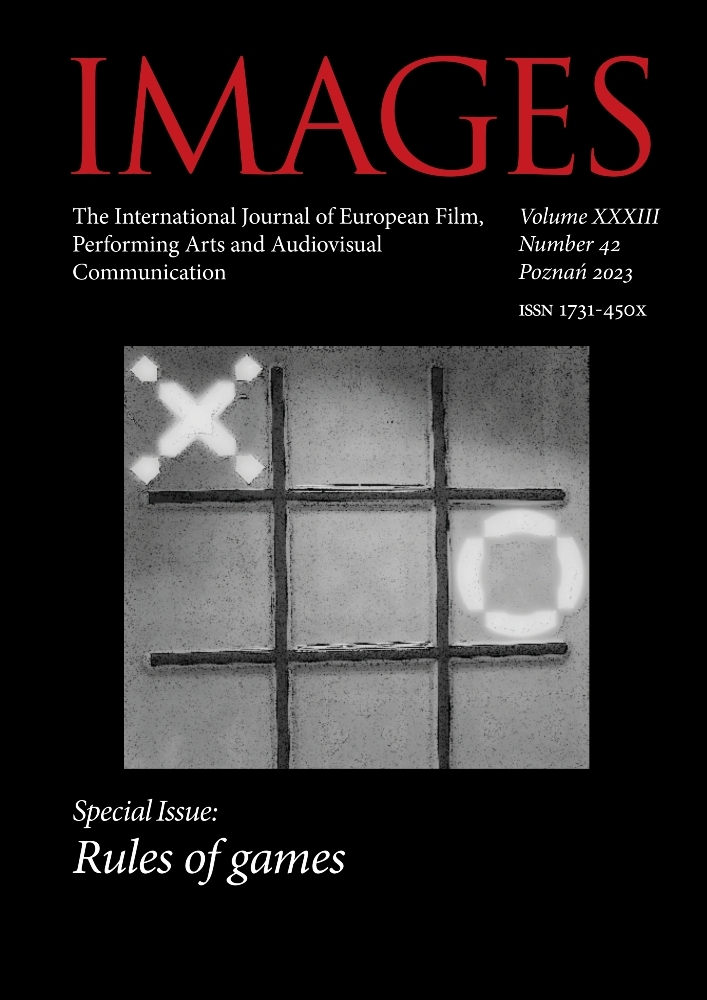Abstrakt
This study presents an analysis of the pattern of communication between developers of socially engaged browser games with political themes and their players. This pattern involves a multilevel disruption of the message carried by the game medium and its construct. The solution is being used by the creators to show and comment on the causes and manifestations of negative processes related to politicians and politics and also having a negative impact on social, economic and cultural issues in their countries. In the course of the analysis, its author considers 141 browser games, originating from 23 countries around the world. Their creators made them between 2000 and 2022, and placed them in publicly accessible portals, offering access to online games via a web browser.
Bibliografia
Black M., Jeszcze o metaforze, przeł. M.B. Fedewicz, „Pamiętnik Literacki” 1983, z. 2, s. 255‒281
Bogost I., Persuasive games. The expressive power of videogames, Cambridge, MA 2007 DOI: https://doi.org/10.7551/mitpress/5334.001.0001
Bogost I., Ferrari S., Schweizer B., Gry informacyjne. Dziennikarstwo epoki cyfrowej, przeł. J. Gilewicz, Kraków 2012
Csikszentmihalyi M., Przepływ. Jak poprawić jakość życia, przeł. M. Wajda, Warszawa 1996
Flanagan M., Critical play: Radical game design, Cambridge, MA 2009 DOI: https://doi.org/10.7551/mitpress/7678.001.0001
Garda M.B., Modele fuzji gatunkowej w grach cyfrowych, [w:] Trajektorie obrazów. Strategie wizualne w sztuce współczesnej, red. R.W. Kluszczyński, D. Rode, Łódź 2015, s. 69‒77
Gębarowski M., Nowoczesne formy promocji, Rzeszów 2007
Griffiths M.D., The therapeutic value of videogames, [w:] Handbook of computer game studies, red. J. Raessens, J. Goldstein, Cambridge, MA 2005, s. 161‒171
Guedes Bailey O., Cammaerts B., Carpentier N., Media alternatywne, przeł. A. Gąsior-Niemiec, Kraków 2012
Łotman J., Uspieński B., O semiotycznym mechanizmie kultury, [w:] Semiotyka kultury, wybór i oprac. E. Janus, M.R. Mayenowa, przeł. J. Faryno, Warszawa 1977, s. 147–170
Mäyrä F., An introduction to game studies: Games in culture, Thousand Oaks, CA 2008 DOI: https://doi.org/10.4135/9781446214572
Michalczyk S., Pojęcie mediatyzacji w nauce o komunikowaniu, [w:] Mediatyzacja kampanii politycznych, red. M. Kolczyński, M. Mazur, S. Michalczyk, Katowice 2009, s. 17–33
Nowell L.S., Norris J.M., White D.E., Moules N.J., Thematic analysis: Striving to meet the trustworthiness criteria, „International Journal of Qualitative Methods” 2017, nr 16(1), s. 1‒13. DOI: https://doi.org/10.1177/1609406917733847
Nowottny W., Metafora, przeł. I. Sieradzki, „Pamiętnik Literacki” 1971, z. 4, s. 221–242
Pawelec A., Metafora pojęciowa a tradycja, Kraków 2006
Perreault G., Vos T., Metajournalistic discourse on the rise of gaming journalism, „New Media & Society” 2020, nr 22(1), s. 159‒176. DOI: https://doi.org/10.1177/1461444819858695
Rittel S.J., Kultura w dyskursie obywatelskim, Kielce 2004
Sobolev J., How many video games exist?, Remarkable Coder, https://remarkablecoder.com/how-many-video-games-exist/ (dostęp: 31.07.2022)
Sweetser P., Wyeth P., GameFlow: A model for evaluating player enjoyment in games, „ACM Computers in Entertainment” 2005, nr 3(3), s. 1‒24. DOI: https://doi.org/10.1145/1077246.1077253
Treisman A.M., Perceptual grouping and attention in visual search for features and for objects, „Journal of Experimental Psychology: Human Perception and Performance” 1982, nr 8(2), s. 194‒214. DOI: https://doi.org/10.1037/0096-1523.8.2.194
Wasilewski J., Retoryka dominacji, Warszawa 2006
Weinschenk S., Motywacja i perswazja. Jak sprawić, by inni robili to, co chcesz, przeł. M.L. Kalinowski, Warszawa 2013
Licencja
Prawa autorskie (c) 2023 Miłosz Babecki

Utwór dostępny jest na licencji Creative Commons Uznanie autorstwa 4.0 Międzynarodowe.

